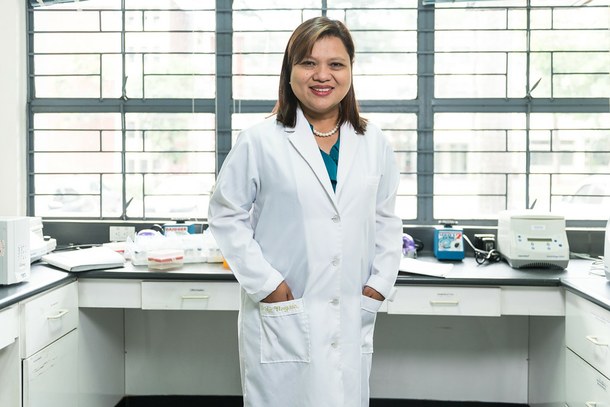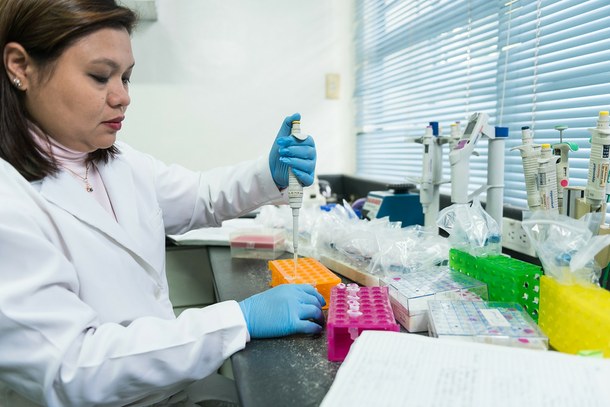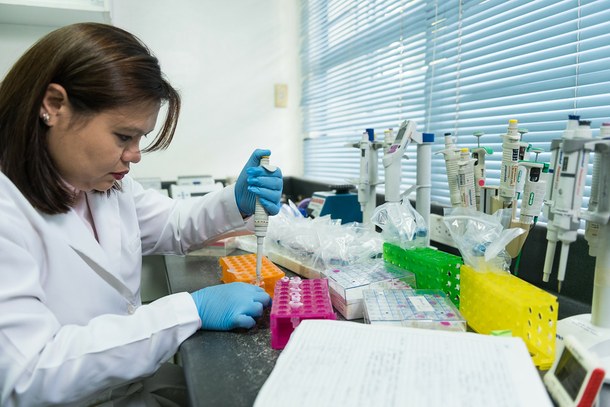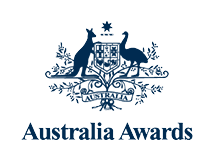Dr. Maria Corazon De Ungria: Science in the service of the Filipino people

When Dr. Maria Corazon De Ungria was nineteen, she took her first plane trip to Australia. And life, as she knew it, was never the same. Armed with her passion for scientific discovery, she went to Australia to pursue an undergraduate degree in microbiology. Little did she know that she would be staying “down under” for eleven years and that she’ll be coming back home not just with a college degree, but also with a Ph.D.
Cora, as she is fondly called by her family and friends, found her perfect match in Australia: she was passionate about learning, and Australia gave her opportunities to learn through different means. Her passion for scientific discovery thrived in the culture of Australia. “People [there] like exploring, which really ties up with what I want. Science to me is an intellectual pursuit. When I went to Australia, my friends and the people there provided another type of pursuit, which is the pursuit of knowledge through other means of discovery – through travel, conversations, cinema…different ways! It’s not the traditional way of learning through books, which is totally different when I was still in the Philippines.”

Like any other lover of learning, Cora sought to know more, to answer more questions, and to reach for the highest possible level of learning in the academe: “My first intention was to go there [in Australia] to study my undergrad. And then I thought why not another year so that I’ll learn more skills. It’s the attitude when you’re doing research…sometimes you cannot stop because you keep on asking more questions. So I sought to take the more challenging path and finish all the way.”
After finishing her undergraduate degree in microbiology at the Macquarie University, she pursued her doctoral degree in microbiology at the University of New South Wales. Her decade-worth of education and experiences in Australia molded her to become the scientist she is today. “My Australian education has equipped me with technical and scientific skills to pursue a research career in the sciences. My passion for scientific discovery was nurtured in highly dynamic and productive research environments at Macquarie University and the University of New South Wales under the able mentorship of excellent Australian scientists.”
Her professors, mentors, and friends in Australia have become an important part of her life. One of her fondest memories in the university was the time the entire school supported her thesis defense even if it was just for formality or paperwork – and even if she was not from Australia. She was amazed by the trust and camaraderie given her by her peers and mentors. “I was not from this country. I didn't know the entirety of this culture, but I was able to leap the divide and be able to reach out to these people in the same way that they reached out to me.”
Of course, her journey was not without pains and challenges. She experienced financial difficulties and worked three jobs to make ends meet. She experienced being homesick, especially during Christmas. She experienced cultural differences that allowed her to be more open to global insights on different issues. All of these experiences contributed to the beauty of her journey.
Through it all, Cora never lose sight of her dream: to use excellent science in building a better Philippines. She could have stayed in Australia or gone to other countries to become a well-paid scientist. She did not have any contract that binds her to come home. But Cora’s genuine desire to serve the country where she first fell in love with learning pushed her to choose the road less traveled. As a graduate of the Philippine Science High School, she decided early on that she will give back. But making this decision after her postgraduate studies – when she was given several tempting offers to work overseas – had not been easy.
“If I go overseas, I may be personally excelling, but I think I need to stay here…I was given opportunities that maybe not all people are getting. I was allowed to have a voice. And if I can provide the voice for the people who do not have, then maybe my life would be of use to some,” she said.
And now, almost twenty years after making that decision, Cora is living her dream. As the head of the DNA Analysis Laboratory of the University of the Philippines Diliman, she and her team have been instrumental in the field of forensic science, particularly in improving the country’s criminal justice system. One of the laboratory’s key contributions under her leadership is the legislation on the use of DNA evidences, which had been promulgated by the Supreme Court and is now being used by trial courts.

“My parents gave up many, many things – material and otherwise – in order for me to get an Australian education and to allow me to pursue my dream, which is to use excellent science in nation building, recognizing the power of science in broadening the base from which we can find creative and novel solutions for the problems that afflict society. For me, DNA is a powerful catalyst for change and I work to be a change-maker to put science at the service of the Filipino people,” she said.
###
In 2017, Dr. Maria Corazon De Ungria was awarded the Most Outstanding Alumni by the Australian Embassy in the Philippines. The Australian Alumni Excellence Awards recognizes the achievements and contributions of Australian-educated Filipinos. Nominations for the 2018 Australian Alumni Excellence Awards is open until April 30, 2018. Visit www.australiaawardsphilippines.org/alumni to nominate outstanding alumni now.

